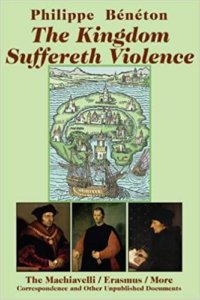Wary of the Systematizing Spirit: Machiavelli, Erasmus, and More

The Kingdom Suffereth Violence: The Machiavelli/Erasmus/More Correspondence and Other Unpublished Documents. Philippe Bénéton. South Bend, IN: St. Augustine’s Press, 2012.
We all know the student who, given a reading assignment asks: “what am I reading for?” An irritating question because, if the meaning of texts could be reduced to a few straightforward propositions, there wouldn’t be much point in reading. Yet the student’s question is but a particularly crude manifestation of the more general tendency of modern reading and writing to ignore modality and assume that a text is written and must be read as a discursive account, as an object before a subject, or at best as a story with a moral. Lyric poetry, drama, certain forms of the novel, and indeed satire are exceptions, of course, but they are part of “art” which, we have learned from the visual arts, conveys its meaning by distortion of what is “naturally” given. Such forms of expression tend, furthermore, to be marginal to modern life.
Philippe Bénéton, Professor of Law and Politics at the University of Rennes, has written a charming book that adopts the artful indirection of his authors in order to illustrate by example rather than by precept how they operate and, in so doing engages rather than confronts his reader with the great questions that they sought to tackle. In wordplay inspired by his sources he develops the conceit of a hitherto unpublished correspondence between Machiavelli, Erasmus and Thomas More, purportedly discovered in Palazzo Tuttofare in Florence and duly elucidated by professors R. Hellish and A. Sbagliato. Jokes aside, the book presents admirable imitations of the Renaissance authors’ style, evidence of Bénéton’s sensitive and insightful reading of the originals.
It is in the nature of the book that it cannot be easily summarized. The reader must take time with it, savor it and follow its meanders. The author is well served by his translator – no easy task given the emphasis on the art of writing.1 In prolegomena and appendices Bénéton drops the mask, indicates primary and secondary sources, sketches historical contexts and offers reflections on the art of writing and on the principles that should guide interpretation. Against post-modern fashion he reaffirms the significance of the intention of the author, even though he allows that the meaning of a text may go beyond the author’s intention. The respectful interpreter will start from the hypothesis that the author knew what he was doing. “One ought to be wary of the systematizing spirit” [p. 239] that seeks to smooth out contradictions and irregularities, as though the exegete knew better than the author, while avoiding both anachronism, i.e. projecting our own ideas backward, and historicism, i.e. considering texts as mere epiphenomena of their time.
In considering texts so “overloaded with interpretations” as those of the three authors treated here, Bénéton wants to lead back to the suggestive complexity of their style and away from reductive foreshortened interpretations that arrive at partial and mutually exclusive conclusions. How can More, for example, be both a Catholic saint and a Soviet hero? How can Machiavelli be candid in The Prince and be a principled humanist and republican at the same time? Recognizing the erudition and ingeniousness of many such, nonetheless forced interpretations Bénéton comments that “any failure to consider the art of writing condemns us to perform great feats in the art of reading” (p. 41).
In the main the fictitious correspondence juxtaposes the Christian Humanism of Northern Europe in two distinct but compatible voices, linked by friendship, to the radical, terrifying and violent freedom of Machiavelli’s Italian Renaissance. More’s yearning for a peaceful Christendom united in one true faith did not come about. Erasmus’ hope of humane reform was overtaken by a Protestant Reformation that “deformed his message”[226] and a Catholic Counter-reformation that had no use for it. Borrowing from Lucien Febvre, Bénéton calls the two friends the vanquished of history. And he concludes with a question–nota bene a question: “Who is the winner? Macchiavelli?”
The title of the book is drawn from Matthew 11:12 “from the days of John the Baptist until now, the kingdom of God suffereth violence, and the violent bear it away”. It is a difficult passage that interpreters don’t find easy to reconcile with the promise to the meek and it invites those who in their theodicy want to elide the problem of evil to explain it away. The Greek verb βιάζεται is not to be taken in the passive voice, we are told, despite the Vulgate’s unequivocal rendering vim patitur. Taken in the middle voice, it could be said to indicate the fervor or inner resolve of converts to enter the kingdom.2 It will not do. Bénéton’s fine book, like the writings of the authors he invites us to revisit, will have alerted us to be looking for allusion and literary context. As we read on, the passage from Matthew ends with: “let him that hath ears to hear, hear.”
Notes
1. That Cardinal de’ Medici and Pope Julius II have retained their Gallicized name of “Jules” in the translation (on p. 78 both Julius and Jules) is but a very small quibble.
2. For instance: Robert H. Mounce, W. Ward Gasque, New Testament Editor, New International Biblical Commentary: Matthew (Peabody, MA: Hendrickson Publishers, 1995), p. 104.




